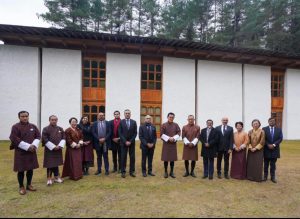India is increasingly feeling under pressure in its own neighborhood as China improves relations with countries that have traditionally been seen by New Delhi as close partners within the region. Many of these countries have resented Indian dominance within the region and see China as a potential balancer against India. Even if the current government is supportive of India, there is usually a political opposition that tends to be pro-China, meaning orientation toward India and China could change with an election. This happened recently in Maldives and was seen as a possible danger in Bangladesh, too.
But even by the standards of India’s relations with its neighbors, the India-Bhutan relationship is special. India took over the British colonial government’s role in Bhutan, essentially making Bhutan a protectorate. This has increasingly come under challenge as Bhutan has evolved politically, with questions about the relationship becoming increasingly salient within Bhutanese politics.
Bhutan also is a critical country for India because Bhutan also shares a border with China. And China has been increasing pressure on Bhutan’s border. In 2017, China and India almost came to blows as Chinese forces tried to enter Bhutanese territory in the Doklam region, which would have given them a tactical advantage over a narrow corridor that connects mainland India to its northeastern region. Thus, New Delhi is particularly sensitive about China-Bhutan relations, especially because any concessions to China by Bhutan on the border can negatively impact India’s security.
It is this context that is important to understand Indian Foreign Secretary Vinay Kwatra’s three-day official visit to Thimphu in late January. The visit took place a day after a new government took charge in Thimphu under Prime Minister Tshering Tobgay. During the visit, Kwatra called on the prime minister as well as Foreign Minister D. N. Dhungyel in addition to holding discussions with his counterpart, Aum Pema Choden, on a range of subjects under the rubric of bilateral cooperation between India and Bhutan.
The foreign secretary also had an audience with King Jigme Khesar Namgyel Wangchuck. Following the meeting with the king, the Indian mission in Bhutan tweeted that it was “An honour to receive the audience from His Majesty the King of Bhutan and benefit from his guidance on ways to further deepen the India-Bhutan unique ties of friendship.” In other words, New Delhi was bending over backwards to please Thimpu.
The Indian Ministry of External Affairs in a press release stated that the foreign secretary’s “visit is in keeping with the well-established tradition of regular exchanges between Bhutan and India, and to further strengthen the existing close ties of friendship and cooperation between the two countries.” Speaking about Kwatra’s meetings, the press release said that it provided “an opportunity for wide ranging discussions on all aspects of the bilateral relationship including development partnership, 13th Five Year Plan, cooperation in energy, trade, technology, connectivity, infrastructure, economic ties, and people-to-people connections between the two countries.”
The foreign secretary’s visit is significant with the new Bhutanese government getting ready to take on the challenging task of working out its border issues with China. Bhutan and China signed a “Cooperation Agreement” on the delimitation and demarcation of their boundary in October 2023 at the 25th round of boundary talks between the two countries. The agreement detailed the responsibilities and functions of the Joint Technical Team (JTT) that has been assigned with the task of the delimitation and demarcation of the Bhutan-China boundary. Finding a border settlement is key to establishing diplomatic relations between Bhutan and China.
The JTT was instituted at the 13th Expert Group Meeting held in August 2023 in order to help implement the Memorandum of Understanding on a Three-Step Roadmap for border settlement which had been agreed upon by Bhutan and China in 2021. The roadmap included the processes of delineating the border on maps, thereafter, visit to the ground and surveys and finally formal demarcation.
There exists no formal diplomatic relations between Bhutan and China, due to Bhutan’s policy of avoiding diplomatic relations with all U.N. Security Council permanent members. Nevertheless, the two countries have maintained regular linkages through high level visits. India, however, is demonstrating that it will do its best to maintain its own ties with Bhutan and limit any Chinese efforts to put pressure on its small but vital neighbor.

































